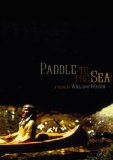
| Cast: | Stanley Jackson (narrator) |
| Genre: | Adventure/Short |
| Director: | Bill Mason |
| Screenplay: | based upon Holling C. Holling's picture book |
| Cinematography: | Bill Mason |
| Composer: | Louis Applebaum |
Realizing that more than half the current theatrical releases within 30 miles of my home were either remakes or sequels - not to mention all the “original” rehashes - I’m thinking it’s time to reassess my generic, basic question to myself of is the movie going to be good? What I really want to see is the movie that’s sincere. Deciding to take my chances on someone failing with integrity over Ray Harryhausen’s unique and unforgetable stop motion characters being replaced by typically generic and lifeless CGI that almost no one will remember by the time I actually finish this review, I opted for a DVD, as usual. One that I’ve been waiting to see is Bill Mason’s Paddle to the Sea, which I immediately suspected would have integrity when I read on the Criterion Collection website “Covering a distance of twenty-two thousand miles over a period of almost two years and in every season, Mason took the exact route through the Great Lakes and down the Saint Lawrence River illustrated in the book—both a visualization of Holling’s work and a pilgrimage.”
Mason’s idea of honoring Holling C. Holling’s still picture book by giving it a moving picture counterpart obviously isn’t merely successful because he films in all seasons for two years, but rather because he’s made a personal journey so impersonal that the experience can be unique to every viewer. Personal filmmaking would become one of Mason’s strength’s, particularly in his most commercially successful documentary Cry of the Wild, which focuses on the two years he spent observing wolves for his good myth crushing documentary Death of a Legend.
Paddle is the ultimate ambigious hero, a miniature wood carved native canoeist who floats down the river perpetually unchanged. Through him we see rivers and oceans, waterfalls and rapids, fires and fireworks, fishing boats and fisherman, and countless animals. Paddle is, in a sense, completely at the mercy of his surroundings, but as he’s an inamimate object, and thus lacks a will or a plan or a perspective, it’s his mere presence that exerts an effect on everything around him.
What makes the film daring is we never learn anything about Paddle. How can we when there is, of course, nothing to learn? That said, almost any other children’s film would anthropomorphize him so we would like him and could relate to him. Instead, Stanley Jackson’s narration imposes no opinion on the proceedings. My initial impression was they made way too much of the danger Paddle is in given not much can really happen to a hunk of wood beyond his paint being stripped or his exterior being chipped, but then I read about them needing to quickly come up with stunt doubles, particularly for the scene where Paddle goes over Niagara falls, because they couldn’t afford to keep losing so hand carved originals. In any case, the important thing is the film never becomes about Paddle’s feelings or desires. The little boy in Ontario carved Paddle, in part, so he could make the journey to the Atlantic Ocean vicariously, but by allowing Paddle to remain silent, passive, serene, and ambigious, we all make this journey as well.
Instead of learning about Paddle, Paddle teaches us about our surroundings, and even ourselves. Filmed from water level, Mason allows the settings and bit players to dictate, as the film lies in their reactions to Paddle. Are the animals startled or afraid of him, or are they completely indifferent? Do they hope to eat him, or is he merely a momentary distraction?
Obviously, on a broader scale, the film is about appreciating nature. Mason spent most of his life in the outdoors. In addition to filmmaking, he’s one of the legendary canoeists, actually more famous in his day for his canoe instructionals, and when he wasn’t on the water he was often in the woods. His own love of nature is obvious from the manner in which he films it, and his body of work is filled with projects designed to both educate and inspire the viewer to discover nature in all shapes, sizes, and forms, both in their own locale and as far as your journey can take you. However, Mason’s movies are never the sort of nature films that would irritate anyone (except perhaps the pollutors or greedy hoarding trappers/hunters), as his methods are infectious without ever being cloying.
Carved on the bottom of the canoe are the words, “I am paddle to the sea, please put me back in the water.” Paddle is perhaps Mason’s ultimate emblem of freedom to pursue one’s greatest pleasure. Because he can only do one thing, there’s no reason to question his life choices (though I suppose we could say it’s actually the thing his child creator desires most) as Mason does of his aviation loving friend Blake James, cameraman on Paddle to the Sea, in Blake. If James is “hobo of the skies” then Paddle is certainly “hobo of the waters”. Paddle to the Sea may be more a unique film than a great one, but though theoretically a children’s film, it is an experience well worth embarking upon for viewers of all ages.
   |